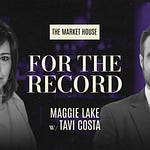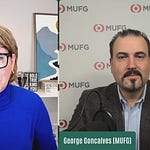Hi everyone,
In today’s episode, I’m joined by Rosenberg Research founder
. We talk about an exogenous interest rate shock, why he’s betting on Treasuries despite the fiscal panic, why investors should never ignore the message from the bond market, and why he believes a recession looms. Recorded May 22, 2025.Snapshot
This Is a Policy Shock, Not a Growth Story
Rosie argues the run-up in yields is driven by fiscal uncertainty and tariffs, not accelerating growth or unanchored inflation.The Bond Market Always Leads
Historically, bond market moves signal what’s coming for equities. Rosie compares today’s setup to 1987 and 2007, where surging yields foreshadowed sharp stock market downturns.The Fed has Lost Some Control
Despite the Fed holding steady, longer-term yields have surged. “The Fed only controls the front end,” Rosenberg says. “It's investors that control yields out the curve. And those are the yields that matter the most.”Recession Risks Are Still Underrated
Soft data (surveys, sentiment) point to a weakening economy, Rosie notes, even if hard data haven’t cracked quite yet.Bullish on Treasuries (Cautiously)
Despite fiscal fear narratives, David sees Treasuries as offering attractive relative value, especially if recession hits. “You don’t need a monster rally to get a double-digit return,” he said.Look at What Housing is Telling Us
The housing market, not AI, remains a main economic bellwether. And housing stocks are down ~35% from their peak, signaling broader trouble ahead.
💡💡💡
“This is an exogenous interest rate shock that we’re seeing right now, and it’s because of all the policy uncertainty… The run up in interest rates is because of the heightened level of uncertainty that’s causing investors to shun and shed duration exposure.”
“We've had a major ratcheting up of rates even with the Fed just being on hold. And it goes to show you that this has nothing to with the Fed, nothing to do with the economy, but it's going to end up biting the economy in the tush.”
“The only central bank that isn't cutting interest rates is the Fed... Normally, that would be leading to a stronger currency. Instead, the dollar is going down, […] telling you that we are in a fundamental bear market on the US dollar, and I think that might be telling you something about an increasing lack of confidence over US domestic economic policy.”
“Personally, I think that this is actually a very attractive buying opportunity for the Treasury market… I'm tempted to think that the worst is behind us on the Treasury market, but I'm predicating that on my view that we are going to be seeing the recession that everybody is scared to call for right now because so many of us, including me, got it wrong in 2022, 2023.”
“The leading indicator of economy is not generative AI and it's not ChatGPT and it's not robots. The housing market still leads and has so many powerful multiplier impacts through the goods part of the economy and the services side. And the housing numbers are rolling over in dramatic fashion. Nobody talks about the home building stocks, and the home building stocks are down 35%.”
“Where's the real funds rate today? It's not negative. It's over 2%. And it's exactly where it's been in the past before economic recessions. So I know I'll be accused of being the boy who cried wolf, to which I say just remember that the wolf does show up at the end of the story.”
“Once I see the whites of the eyes of the recovery, I’ll shift out of Treasuries.”
Enjoy… and have a great weekend,
Maggie
Important Disclaimer: It is crucial to remember that this article is for informational purposes only and should not be considered investment advice. Consult with a qualified financial advisor to assess your risk tolerance, investment goals, and overall financial plan











